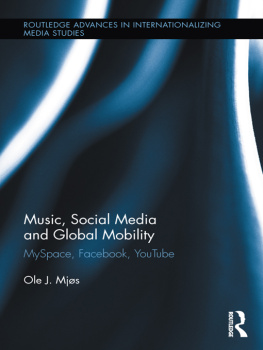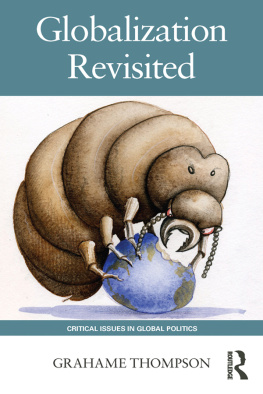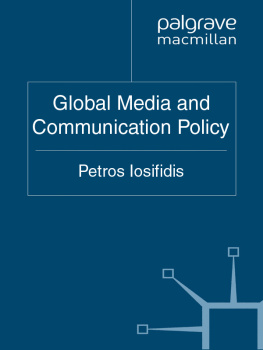
Media Globalization and the Discovery Channel Networks
This book is about the relationship between media and globalization, explored through the unique study of the global expansion of Discovery Communications, spearheaded by the Discovery Channel, one of the worlds largest providers of factual television programming and media content. The book argues that the study of Discoverys relationship with globalization provides both a specific and a more general practical and theoretical understanding of how the processes of increased linking and interweaving of media and communications unfold and develop, as well as some of the consequences of this.
Ole J. Mjos is a Post Doctoral Fellow at the Department of Information Science and Media Studies, University of Bergen, Norway. He completed his PhD at the University of Westminster, UK, in 2007. His previous professional experience in the media and creative industries includes work in television documentary production, and contributions on many records within the wide genre of electronic music.
Routledge Advances in Internationalizing Media Studies
1. Media Consumption and Everyday Life in Asia
Edited by Youna Kim
2. Internationalizing Internet Studies
Beyond Anglophone Paradigms
Edited by Gerard Goggin and Mark McLelland
3. Iranian Media
The Paradox Modernity
Gholam Khiabany
4. Media Globalization and the Discovery Channel Networks
Ole J. Mjos
Media Globalization and the Discovery Channel Networks
Ole J. Mjos

New York London
First published 2010
by Routledge
270 Madison Ave, New York, NY 10016
Simultaneously published in the UK
by Routledge
2 Park Square, Milton Park, Abingdon, Oxon OX14 4RN
Routledge is an imprint of the Taylor & Francis Group, an informa business
This edition published in the Taylor & Francis e-Library, 2009.
To purchase your own copy of this or any of Taylor & Francis or Routledges collection of thousands of eBooks please go to www.eBookstore.tandf.co.uk.
2010 Taylor & Francis
All rights reserved. No part of this book may be reprinted or reproduced or utilised in any form or by any electronic, mechanical, or other means, now known or hereafter invented, including photocopying and recording, or in any information storage or retrieval system, without permission in writing from the publishers.
Trademark Notice: Product or corporate names may be trademarks or registered trademarks, and are used only for identification and explanation without intent to infringe.
Library of Congress Cataloging in Publication Data
Mjos, Ole J., 1970
Media globalization and the Discovery Channel networks / by Ole J. Mjos.
p. cm.(Routledge advances in internationalizing media studies ; 4)
Includes bibliographical references and index.
1. Discovery Channel (Firm) 2. Television and globalization. I. Title.
PN1992.92.D57M56 2009
384.55'5dc22
2009005679
ISBN13: 978-1-135-21372-5 ePub ISBN
ISBN10: 0-415-99246-X (hbk)
ISBN10: 0-203-87294-0 (ebk)
ISBN13: 978-0-415-99246-6 (hbk)
ISBN13: 978-0-203-87294-9 (ebk)
Contents
Tables
| 2.1 | Subscribers to Discovery Networks US |
| 2.2 | The Roll-out of Discovery in Europe |
| 2.3 | Indian Televisions Triumvirate |
| 2.4 | Subscribers to Discovery Networks International |
| 2.5 | Global Revenue |
| 2.6 | The Five Television Channels with the Largest Market Shares |
| 2.7 | Network Viewer Product Usage/Lifestyle Profile |
| 2.8 | Demographic Targeted Programming |
| 2.9 | Discoverys Nine Branded YouTube Destinations |
| 3.1 | Documentary Channels in the US |
| 3.2 | Top 25 Television Network Brands Ranked by Quality Score, 2006 |
| 3.3 | Top 25 Online Brands Ranked by Quality Score, 2006 |
| 3.4 | Discovery Internationals Presence |
| 3.5 | Discovery Internationals Television Channels |
| 3.6 | Discovery Global Businesses and Brands |
| 3.7 | Interbrand: Best Global Brands 2005 |
| 4.1 | Number of BBC and Discovery Co-productions Presented in BBC Worldwide Program Sales: 20022006 |
| 4.2 | The Walking with Factual Brand |
| 4.3 | The Ten Most Memorable Factual Programs, 2003 |
| 5.1 | European Growth of Channels by Genre: Documentary Channels |
| 5.2 | Documentary Programming (hours) on Public-service Channels in Europe, 20022004 |
| 5.3 | Hours of Factual and Learning on BBC Television Channels |
| 5.4 | All FeedsDiscovery Europe Networks |
| 5.5 | Discovery Channel UK: Percentage of Content in Categories |
| 5.6 | Discovery Channel Norway: Percentage of Content in Categories |
| 5.7 | Main Language of Programing |
| 5.8 | Total Number of Programs Broadcast in Thematic Categories |
| 5.9 | Ofcom, Factual Television Genre Definitions |
| 6.1 | Market Share by Genre |
| 6.2 | List of Discoverys Global Specials for 2004 |
Figure
| 5.1 | Discovery Networks Europe regional structure: the Nordic region |
Acknowledgments
Various individuals have contributed in different ways in making this book possible. I thank, in particular, Daya K. Thussu, Colin Sparks, and Annette Hill, all at the University of Westminster, UK, and Tehri Rantanen, of London School of Economics. At the University of Bergen, Norway, I want to express my gratitude to Knut Helland, Hallvard Moe, Lars Nyre, Jostein Gripsrud, and Torny E. Aarbakke.
I am grateful to everyone who kindly let me interview them for this project as well as to Erica Wetter my editor at Routledge, and to Elizabeth Thussu for help with editing.
Finally, I thank my mother Kari, father Ole, and my sisters Hilde and Elisabeth Mjos, and all my dear friends for continuous support and encouragement.
Media Globalization and Televisual Culture
(A) principle is to think globally and to act locally. The new technologies give us the chance to span the world and tie it together in ways never before imagined. The goal is not to export one culture in an effort to dominate and denigrate others. It is to showcase a mosaic of influencesto venerate the best of many cultures in hopes of forming a truly global culture.
(Hendricks, founder and chairman of
Discovery Communications, 1999)
INTRODUCTION
This book is about the relationship between media and globalization, explored through the study of the global expansion of Discovery Communications, spearheaded by the Discovery Channel, one of the worlds largest providers of factual television programing and media content. The book argues that the study of Discoverys relationship with globalization provides both a specific and a more general practical and theoretical understanding of how the processes of increased linking and interweaving of media and communications unfold and develop, as well as some of the consequences of this.







